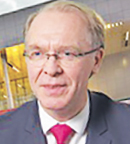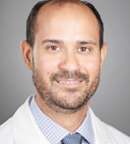
Thierry Facon, MD

Michael Jain, MD, PhD
Thierry Facon, MD, Professor of Hematology at Lille University Hospital in France, and Michael Jain, MD, PhD, of Moffitt Cancer Center, Tampa, were interviewed by The ASCO Post on the second-generation chimeric antigen receptor (CAR) T-cell products for treating multiple myeloma.
According to Dr. Facon, essentially comparable results are being reported for the agents in development. It is important to note, he added, that CAR T-cell studies conducted in China enroll less heavily pretreated patients, which can affect outcomes. “That’s something of a Chinese signature,” he said. Chinese studies also tend to report more grade 3 [cytokine-release syndrome], “which might be the construct or could be because of management.”
Dr. Facon emphasized, “The good thing is that all the studies show efficacy. I don’t care much about a 90% response rate vs 100%. Basically, all patients will get a response, and many will get a high-quality, though short-term, response—so the next question is the follow-up.”
LEGEND-2 has now provided longer follow-up in a larger population.1 However, it enrolled Chinese patients who were less pretreated and therefore less applicable to the U.S. setting, he pointed out. “It will be very interesting to see the longer follow-up of CARTITUDE.”
The other good news is that rates of severe cytokine-release syndrome and neurotoxicity are low, he continued. “All patients will get some degree of [cytokine-release syndrome], but grade 3 [cases] with bb2121 and JNJ-4528 [occur with an incidence] below 5%.”
Will one CAR T-cell product prove to be more effective than another? Although the patient populations are different among the studies, JNJ‑4528 appears at this point to produce a longer duration of response, noted Dr. Facon. “From my point of view, JNJ-4528 has a strong position because investigators have data from two studies. They have a ‘package,’ and they are building a story,” he said.
Additional Commentary
Dr. Jain, a cellular immunotherapy specialist at Moffitt, agreed that the follow-up is too short to understand the durability of response, especially with the second-generation agents JNJ-4528 and BM38, as presented at the ASH meeting.
If lymphoma is any indication, about 40% of responders could expect durable remissions, he predicted. Whether remissions will be more prolonged with these newer products, or whether they will be more effective, remains to be seen, he said. “With progression-free survival of about 9 months, as is being seen now, we know there’s room for improvement,” he commented.
The investigators of the dual-targeted constructs also believe that their products may be better tolerated. Much of this depends on the biology of the tumors, ie, “the interplay between the CAR T cells and the patient,” Dr. Jain pointed out. “Myeloid cells get sensitized by inflammation, and when you put CAR T cells into that milieu, if you already have activated myeloid cells, you’ll get lots of toxicity.”■
DISCLOSURE: Dr. Facon has received fees for serving on a board of directors, advisory committee, and speakers bureau from Celgene, Janssen, and Takeda and for serving on a board of directors and advisory committee from Amgen, Sanofi, Karyopharm, Oncopeptides, and Roche. Dr. Jain has been a consultant or advisor for Kite/Gilead.
REFERENCE
1. Chen L, Xu J, Fu W, et al: Updated phase I results of a first-in-human open-label study of Lcar-B38M, a structurally differentiated chimeric antigen receptor T-cell therapy targeting B-cell maturation antigen. 2019 ASH Annual Meeting & Exposition. Abstract 1858. Presented December 7, 2019.

